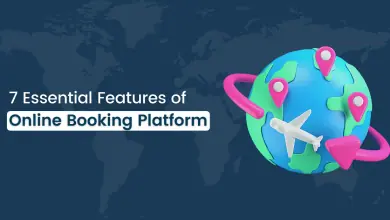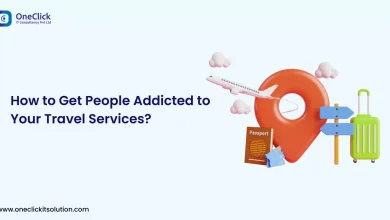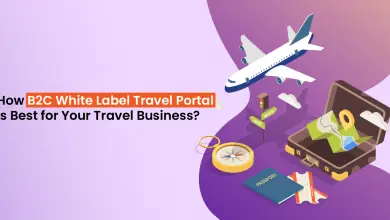Travel Booking App Development Essentials: Features and Cost Considerations
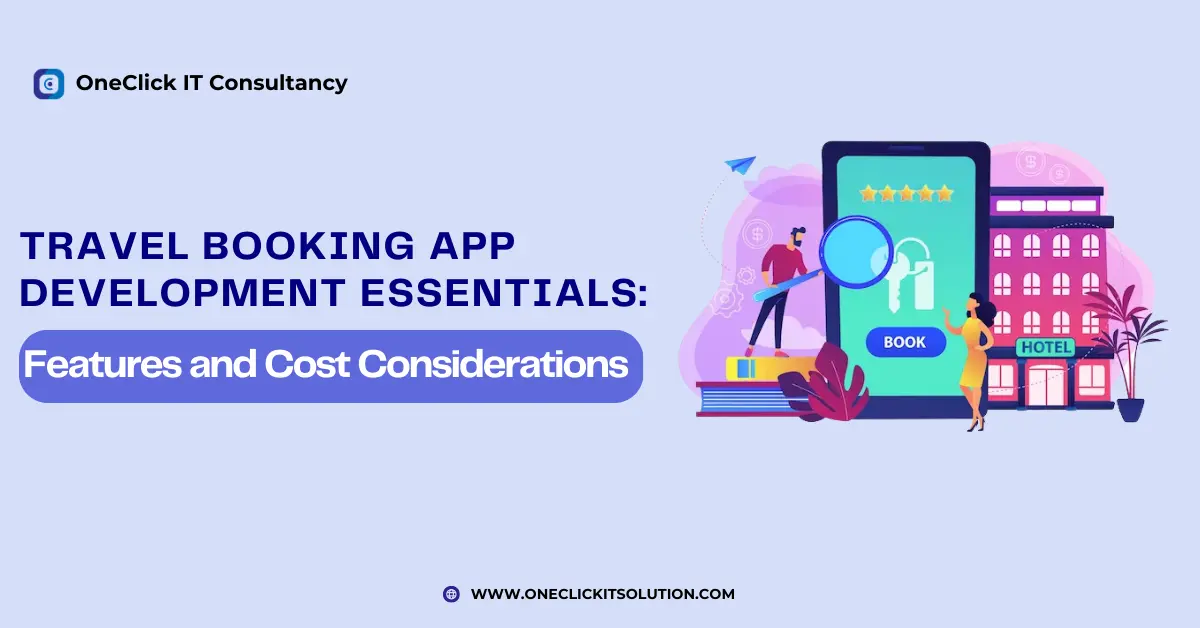
Introduction
How would that feel if, with just a few taps on their smartphone, your customer is, your customers swiftly click, book, and confirm their reservation – all within minutes using the best travel booking apps? – all within minutes. That’s the power of online travel booking app systems, and it’s changing the game for businesses like yours.
But are you keeping up? The online booking boom is real, and it’s not slowing down. Across industries like travel, healthcare, hospitality, and even food, businesses are investing heavily in booking apps for travel to streamline operations and meet customer expectations.
Here’s why you would want to listen:
- Explosive Demand: From travel to healthcare to restaurants, 60% of customers now prefer online travel booking app, with in-person booking a mere 3%. Ignoring this trend could leave your business behind.
- Market Boom: The online booking software market is projected to reach $633 million by 2025, growing at an impressive 19% annually. This surge reflects the immense value businesses are finding in these systems.
- Efficiency Powerhouse: Streamline your operations, reduce manual tasks, and free up your staff for higher-value activities. Travel booking apps can automate scheduling, payments, and communication, saving you time and money.
Additional Statistics for Travel Booking Apps
1. When it comes to revenue, as of 2021, bookings have been leading the online travel agency. Last year, the big three achieved a 60% growth in revenue.
2. In 2019, more than one billion travel application users and up to 1.5 billion individuals globally went on a trip.
3. It was also found that individuals who used an internet book or smartphones were more than 65%.
4. The mobile application’s global revenue is $318 billion.
5. Over 200 billion mobile applications were downloaded as of 2019.
6. More than 613 billion US dollars in revenue will be generated in mobile applications by 2025.
But, don’t worry, we’ve got you covered. In our comprehensive guide, we’ll talk about:
- Must-have features: From search and booking to payments and reminders, we’ll guide you through the essential functionalities in travel booking apps.
- Cutting-edge technology: Understand the latest trends and tools that will make your Travel booking app stand out.
- User-friendly design: Learn how to create an intuitive and visually appealing customer experience in your travel booking app.
- Cost considerations: Get a clear picture of the investment in building your dream travel booking app.
Why Your Business Needs a Travel Booking App in 2024: More Profits, More Customers, More Growth
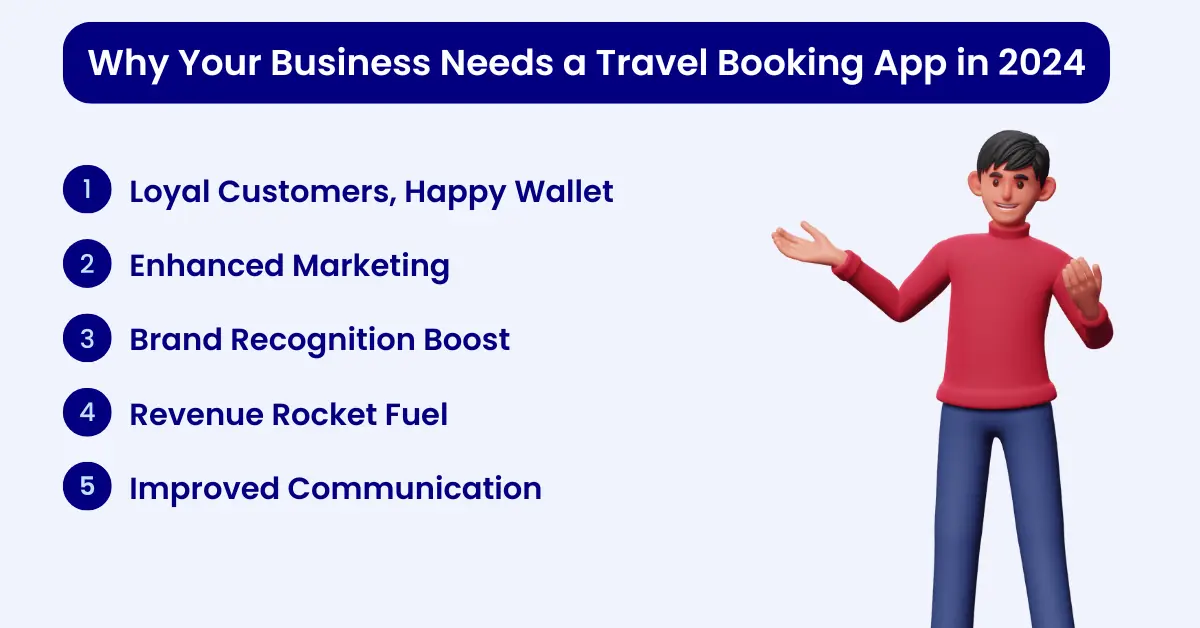
82% of your potential customers are glued to their smartphones, ready to book experiences on the go using the best travel booking apps. But can they easily book with you? If not, you’re missing out on a massive opportunity. With a bespoke travel booking app, your customers could whip out their phone and seamlessly book in seconds instead of struggling through lengthy calls or confusing websites. Sounds pretty good, right?
Think about the numbers:
- Airbnb: It started with $600,000 and is now valued at $79 billion. Their app for travel booking drives 170 million monthly visits and 2.5 million downloads every month.
- 54% of customers book on the go. Are you offering them a seamless mobile experience with booking apps for travel?
- 67% prefer online booking. Is your business capturing this massive market with a travel booking app?
In today’s mobile-first world, a travel booking app isn’t just a nice-to-have; it’s imperative for business. Let’s break down why investing in one is a no-brainer for your company:
1. Loyal Customers, Happy Wallet: Forget phone calls and long lines. With a travel booking app, customers can reserve their spot anytime, anywhere, building loyalty and convenience into your brand. Remember, 54% of bookings happen on the go!
2. Enhanced Marketing: Your travel booking app becomes a goldmine of user data. Access to extensive user data analytics allows businesses to improve marketing efforts and attract more customers. Analyze behavior, demographics, and preferences to craft laser-targeted marketing campaigns that attract even more customers.
3. Brand Recognition Boost: Your travel booking app is your digital storefront, the first impression many customers will have. Make it sleek, user-friendly, and secure, and you’ll instantly elevate your brand image in their eyes. A high-quality, user-friendly travel ticket booking app is the first point of contact with customers, enhancing brand recognition and trust.
4. Revenue Rocket Fuel: 67% of people prefer online travel booking apps! By offering it, you tap into a new customer base that wouldn’t have bothered with traditional methods. Plus, explore monetization options like subscriptions, advertising, or booking fees for extra revenue streams.
5. Improved Communication: Booking apps for travel offer users quick and convenient booking options, improving customer satisfaction. Your app becomes a direct communication channel with customers. They can book, get help, and receive personalized offers effortlessly, leading to happier customers and increased sales.
Look at Airbnb’s meteoric rise: from a seed investment to a multi-billion dollar empire built on a powerful app for travel booking. Airbnb’s valuation grew from $600,000 in seed investments to nearly $79 billion, with the app achieving over 170 million monthly visits and 2.5 million downloads by July 2023.
Engage, Automate, Grow: Choosing the Right Online Booking App
First things first, understand your needs: On-Demand or In-Advance?
On-Demand Booking Apps: Need instant gratification? These best travel booking apps connect users with real-time services like deliveries, taxis, and repairs. For example, Uber, DoorDash, and Handy are perfect for businesses offering immediate solutions like food delivery, laundry services, or home maintenance.
In-Advance Booking Apps: Planning is your jam? These booking apps for travel allow users to schedule appointments and reservations, offering greater flexibility and control. A few examples include OpenTable, Airbnb, and Eventbrite. They are ideal for industries like restaurants, hotels, travel agencies, and event organizers.
Let’s explore the above 2 categories in more detail:
1. On-Demand Booking Apps: Instant Gratification
What They Are: These apps serve users who need immediate service, from hailing a ride to getting a meal delivered. Users select what they need, order, and wait for the service delivered or executed.
Perfect For Industries Like:
- Taxi or Ride-Hailing Services: This is one of the best travel booking apps, and it is ideal for companies with their fleet or coordinating drivers like Uber.
- Delivery Services: Connect couriers with suppliers to quickly deliver food, flowers, or heavy goods. Logistics apps like Landtran are examples.
- Housing Services: This is for booking home maintenance services such as repairs or cleaning, with TaskRabbit and Handy being prime examples.
- Laundry Services: Apps like ByNext and Rinse offer laundry pick-up and delivery at user-specified times.
2. In-Advance Booking Apps: Plan Ahead
What They Are: These booking apps for travel allow users to book services or appointments well in advance, ensuring they secure a spot at their convenience.
Industries That Benefit:
- Food and Beverage: Transform how restaurants, cafes, and bars reach customers, with giants like UberEats and DoorDash leading the pack.
- Travel Industry: Simplify booking transport tickets by connecting users with available offers, as seen with the Farelogix travel booking app.
- Hotel Industry: Connect travelers with accommodations tailored to their needs, with platforms like Booking.com and Airbnb setting the standard.
- Events and Entertainment: Facilitate booking venues or purchasing event tickets online, similar to the Events10X platform.
- Beauty Industry: Empower customers to book salon and spa appointments from their devices, with Treatwell as a prime example.
- Healthcare Industry: Connect travelers with accommodations tailored to their needs, with platforms like Booking.com and Airbnb setting the standard for apps for travel booking.
Business Considerations
Remember, choosing the right travel booking app goes beyond just functionality. The best travel booking apps should be tailored to your specific needs. Consider factors like:
- Your target audience: What are their expectations and preferences?
- Your budget: How much will you invest in development and maintenance?
- Your desired features: Do you need appointment scheduling, payment processing, or marketing integrations?
- Scalability: Will the app grow with your business?
- User-friendliness: Is it easy for customers to navigate and book?
- Integration: Can it connect with your existing systems?
- Cost-effectiveness: Does it fit your budget?

Don’t Just Book, Connect: Features That Set Your Ticketing App Apart
Core Features for User and Admin Panels
User Panel: For Your Customers
1. Effortless Interface: Design a user-friendly interface that breezes flight searching and booking. Think intuitive navigation, clear menus, and easy-to-understand options.
2. Seamless Sign-up: Offer multiple sign-up options, including email, phone number, and social media accounts, catering to diverse preferences.
3. Secure Verification: Ensure user confidence with secure verification processes like OTPs sent via email or phone.
4. Advanced Search Filters: Enable users to find the perfect flight with customizable search options like destination, date, price range, preferred airlines, and stopovers.
5. Reliable Payment Gateway: Integrate a secure and trustworthy payment gateway for smooth, stress-free transactions.
6. Real-time Alerts: Give users timely notifications about flight status changes, gate updates, and potential delays.
7. Loyalty Program: Reward frequent flyers with a loyalty program that offers attractive discounts, exclusive benefits, and special offers.
8. Review and Ratings: Allow users to share their experiences with airlines, accommodations, and destinations, empowering informed travel decisions.
Admin Panel: For Your Business
1. Flight Management: Grant complete control over flight data, including schedules, availability, and pricing, ensuring real-time updates.
2. Booking Management: Manage user reservations, cancellations, and refunds efficiently, streamlining your operations.
3. Payment Management: Track and manage all payments, including commissions and refunds, for clear financial oversight.
4. Multi-channel Support: Offer responsive customer support through phone, email, and in-app chat, ensuring prompt assistance.
Advanced Features for a Cutting-Edge Experience
Innovative User Engagement:
1. Multilingual Support: Expand global reach by supporting various languages.
2. In-App Chat: Integrate real-time chat for immediate customer service support.
3. AI Integration: Use artificial intelligence for personalized travel suggestions and optimal deal discovery.
4. Virtual Reality Tours: Offer 360-degree tours of airports and planes to enhance planning and booking experience.
Social and Operational Integration:
1. Social Media Integration: Enable users to share travel plans and experiences, boosting social engagement.
2. Accounting APIs: Simplify financial management and tracking within the travel booking app for admins.
Implementing the Features
- Start with the Basics: Ensure the customer and admin panels are intuitive, secure, and comprehensive, covering all fundamental operational needs.
- Elevate the Experience: Incorporate advanced features that set your app apart, focusing on personalization, engagement, and user convenience.
- Focus on Engagement and Efficiency: Utilize AI, VR, and social media integrations to make the app not just a tool for booking flights but a platform for exploring and experiencing travel possibilities.
Remember, the best features are those that solve customer pain points and add value to their experience.
Don’t Confuse, Convert: UI/UX Design Tips for Your travel App
Suppose a customer opens your travel booking app, ready to book their next adventure. But instead of excitement, they’re met with confusion, cluttered interfaces, and frustrating navigation. That’s the perfect recipe for lost bookings and frustrated users. Winning over users in today’s mobile-first world starts with exceptional UI/UX design. Here are some key tips to remember:
1. Minimalistic User Interface:
- Simplicity is Key: Your app for travel booking user interface should be clean and straightforward, displaying only essential information without overwhelming users with unnecessary details.
- Focus on Clarity: Ensure that key features and functions are easily accessible and prominently displayed, guiding users through the booking process seamlessly.
- Streamlined Design: Opt for a minimalist travel booking app design approach to create a visually appealing interface that enhances usability and reduces cognitive load for users.
2. Thoughtful User Experience:
- Smooth Navigation: Prioritize user experience by ensuring smooth navigation throughout the app. Conduct thorough UX research to understand user preferences and behaviors, then implement these insights to create an intuitive user journey.
- Personalization: Tailor the user experience to individual preferences and needs, providing personalized recommendations and suggestions based on user behavior and history.
- Seamless Interactions: Optimize interactions within the app for travel booking to be intuitive and user-friendly, minimizing friction points and maximizing user engagement.
3. Consistency:
- Unified Design Language: Maintain consistency in design elements, layout, and branding across all screens and pages of your app. Consistency fosters familiarity and trust, making it easier for users to navigate and interact with your app for travel booking.
- Brand Identity: Ensure that your app’s design reflects your brand identity and values, reinforcing brand recognition and loyalty among users.
- Visual Hierarchy: Establish a clear visual hierarchy to guide users’ attention and prioritize important information, helping them focus on key actions and content.
Implementing UI/UX Design Tips
Creating a travel booking app that caters to a diverse user base requires a deep understanding of your audience’s needs and preferences. Here’s how you can implement these tips into your app development process:
- Conduct User Research: Gather insights into your target users’ behaviors, preferences, and pain points. This information will guide your minimalistic UI design, ensuring it resonates with your audience.
- Prototype and Test: Develop prototypes based on your UI/UX design principles and test them with real users. This iterative process allows you to refine the user experience, ensuring it’s as smooth and intuitive as possible.
- Seek Feedback and Iterate: Post-launch, continue collecting user feedback and monitoring app performance. Use this data to make ongoing improvements, keeping your app’s design fresh and aligned with user expectations.
By following these UI/UX design principles, you’ll create a functional travel booking app that’s a delight to use. Remember, a happy user is loyal, which translates to more bookings and success for your business!
The Blueprint: Technology Stack for Travel Booking App
So you’re ready to take your business online with custom travel booking apps! But before the exciting design and features come to life, you need a solid foundation – the tech stack. It’s the foundation that will determine the sturdiness, efficiency, and appeal of the final product. Worry not, we’ll break it down for you:
1. iOS and Android Development: Crafting the Core
- iOS Development: Choose between Swift and Objective-C. Swift, with its modern syntax and safety features, is akin to using steel beams for construction—strong and efficient. Objective-C, on the other hand, is like traditional wood framing, reliable with a rich history but requiring a bit more care.
- Android Development: Opt for Kotlin or Java. Kotlin is the innovative composite material offering safety and simplicity, streamlining your development process. Java is the classic brick and mortar, time-tested and versatile, but requiring skilled craftsmanship to use effectively.
2. Cross-Platform Development: Bridging the Gap
Utilize Xamarin, React Native, or Flutter. These frameworks are your architectural designs that allow for building on multiple terrains (iOS and Android) simultaneously. Xamarin is like a prefabricated building—quick to assemble with familiar materials (C#). React Native and Flutter are the innovative green materials, offering flexibility and efficiency, with Flutter enabling particularly expressive UIs akin to custom-designed features in a home.
3. Backend Development: The Foundation
Choose Python or PHP for your app’s backend. Python is the reinforced concrete foundation—robust and versatile for various applications, from web services to data analysis. PHP is the solid bedrock, widely used and deeply integrated into the web ecosystem, supporting dynamic content with ease.
4. UI/UX Design: The Aesthetics and Flow
For iOS, use UIKit or SwiftUI; for Android, turn to Android UI or Jetpack Compose. These are your interior and exterior design tools, ensuring your app is functional and visually appealing. Figma stands out for cross-platform projects. It is the 3D modeling software that helps visualize the final product before the build, ensuring consistency and user-friendliness across all devices.
5. Integrations: Adding Utilities and Amenities
- Calendar Integration with Google Calendar or Zoho ensures your app for travel booking keeps Yes! Feedback! With specificity.
- Appointments organized like a well-planned electrical grid.
- Payment Integration via Stripe or Braintree offers secure transaction channels, much like plumbing systems that need to be reliable and leak-free.
- Feedback Integration with Twilio or Lumoa allows for direct communication lines with your users, akin to installing phone and internet lines in a house.
- Push Notifications through Pusher or OneSignal act as the doorbell of your app, alerting users to important updates or offers.
- Maps Integration using the Google Maps API provides your users with easy navigation, like clear, well-signposted roads leading to a destination.
Feeling overwhelmed? Don’t worry! A successful travel booking app mobile app development requires expertise. At OneClick, our team of experts can help you grasp the ins and outs of tech stack for the perfect bus travel booking app mobile app development for your business.
Cost Dynamics of Travel Booking App Development
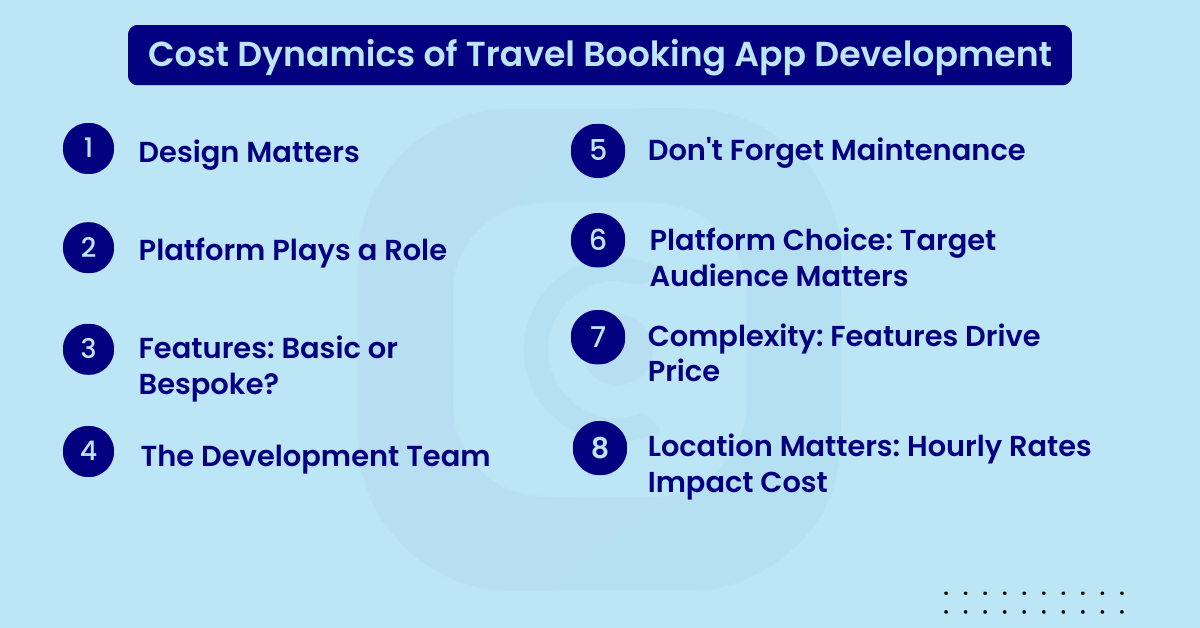
So, you’re ready to create a revolutionary travel ticket booking app? Fantastic! But before jumping straight into the development process, it’s crucial to understand the various factors that influence the cost. Let’s see what are these:
1. Design Matters:
- Aesthetics come at a cost: A trendy, user-friendly design enhances customer experience but adds to development costs.
- Think long-term: While the initial investment might be higher, a great design can lead to user satisfaction and increased app usage, justifying the cost in the long run.
2. Platform Plays a Role:
iOS vs. Android: Generally, iOS apps require less testing, leading to potentially lower development costs.
Android’s wider range of devices necessitates more testing and optimization, impacting the cost.
3. Features: Basic or Bespoke?
- Complexity drives cost: Adding features like mobile wallets or advanced booking systems increases development time and cost.
- Advanced Features, Higher Costs: Integrating features like mobile wallets or complex booking systems adds complexity and cost. Businesses initially prioritize these to stand out, but a strategic balance is crucial.
4. The Development Team:
Building an app takes teamwork! Different specialists contribute their expertise:
- Project Managers: Oversee the development process, ensuring smooth execution and timely delivery.
- Developers: Bring the travel booking app to life, with front-end developers focusing on user interface and experience and back-end developers handling server-side logic and data management.
- UI/UX Designers: Craft the user interface and experience, making the app visually appealing, intuitive, and easy to navigate.
- Graphic Designers: Create visual elements like logos, icons, and images to enhance the app’s aesthetics.
- QA Testers: Meticulously test the app to identify and fix any bugs or issues, ensuring smooth functionality.
5. Don’t Forget Maintenance:
Apps need ongoing care: Post-development maintenance is crucial for bug fixes, security updates, and keeping your app functioning flawlessly.
Factor in maintenance costs when budgeting for your app. The complexity of your app directly affects maintenance costs, impacting the overall cost of development.
6. Platform Choice: Target Audience Matters:
- Align your platform with your audience’s location: If your target users are primarily in Asia or Africa, prioritize an Android app. For US or European users, an iOS app might be better suited.
- Remember: Developing an Android app can be costlier than iOS because a wider range of devices requires testing.
7. Complexity: Features Drive Price:
- Simple App, Faster Development: Basic apps with limited features can be developed quickly, keeping costs lower.
- Complex Features, Longer Development: Adding features like social media integration or extensive customization options increases development time and cost.
8. Location Matters: Hourly Rates Impact Cost:
Developer rates vary by region: Developers’ hourly rates vary based on their location. Developers in regions like the US may charge higher hourly rates than those in countries like India, which can affect overall project expenses.
Ticketing to Success: Which is the Right Business Model for Your App
1. Aggregator Model: Choice and Convenience
The aggregator model is a comprehensive platform, providing users with a broad spectrum of flight options from various airlines. It simplifies the booking process by allowing users to compare rates and itineraries, making informed decisions easily.
Key Features:
- Middleman Functionality: Your app for travel booking will be the intermediary between customers and airlines, facilitating bookings and earning a commission on each transaction.
- Wide Range of Options: Users benefit from access to domestic and international carriers, broadening their choices.
- Benefits for Airlines: This model offers airlines an expanded customer base, introducing their services to a wider audience through your platform.
- Benefits: The aggregator model is highly beneficial for users seeking convenience and variety, making it a popular choice among those looking to explore multiple flight options in one place.
2. Dedicated Model: Seamless Experience
Contrary to the aggregator approach, the dedicated model focuses on providing services from a single airline or a select group of airlines. This model focuses more on creating a direct connection between consumers and airlines, streamlining the booking process.
Key Features:
- Exclusive Services: The travel booking app allows consumers to manage their bookings, check flight statuses, and access airline-specific perks.
- Loyalty and Personalization: Airlines can leverage customer data collected via the app to offer personalized discounts, services, and loyalty rewards, enhancing customer retention.
- Benefits: Known for delivering a seamless booking and travel experience, the dedicated model is favored by frequent travelers who appreciate the convenience and personalized services offered by apps like Delta Airlines, Southwest Airlines, and Emirates.

Choosing Between Aggregator and Dedicated Models
1. Consider Your Target Audience:
- Aggregator suits users seeking variety and the best deals across multiple airlines.
- Dedicated appeals to customers looking for a seamless experience with a specific airline.
2. Revenue Considerations:
- The aggregator model relies on commissions from bookings.
- Dedicated model may leverage direct sales and personalized promotions to drive loyalty and repeat business.
3. Brand Alignment:
- Aggregator model positions your app as a comprehensive travel tool.
- Dedicated model aligns closely with an airline’s brand, offering a deepened brand experience.
Development Cost Implications
- Aggregator Model: May involve higher initial development costs due to the need for integrating multiple airlines’ data, but offers broader revenue opportunities through commissions.
- Dedicated Model: Focuses on in-depth integration with a single airline’s system, potentially lower initial costs but requires strong partnership agreements to ensure profitability.
Turning Clicks into Cash: Monetization Strategies for Your Travel App
You’ve built a fantastic app for travel booking brimming with features and attracting a growing user base. But how do you turn that user buzz into real revenue? Monetization is the key! Let’s explore three proven monetization models for your travel booking app:
Merchant Model: Connecting Travelers and Providers
By adopting the merchant model, Your app for travel booking acts as a marketplace, connecting users with airlines and other travel providers. You charge them a listing fee (flat or percentage-based) to reach your audience. Here’s how it works:
- Service Listing Fees: Airlines and travel operators pay to list their services on your platform. You could charge a flat fee or a percentage of each transaction.
- Commission Earnings: Every booking made through your travel booking app generates a commission, turning your platform into a profitable ecosystem for both you and the service providers.
- Benefit: This model not only offers a win-win for airlines and travelers but also establishes your app as a one-stop shop for travel bookings. Apps like Expedia and Orbitz are shining examples of the merchant model in action.
Commission Fee: Earning on Every Booking
Now, picture each booking made through your app as a stream contributing to a river of revenue. The commission fee model is straightforward:
- Booking Commissions: Charge a commission for every reservation made through your app, calculated as either a fixed percentage of the booking amount or a variable rate based on the service type.
- Diverse Offerings: Expand your commission opportunities by including flights, hotels, transportation, and travel insurance, transforming your app into a comprehensive travel planner.
- Benefit: This approach not only simplifies trip planning for your users but also enhances your revenue as you diversify the services offered. Booking.com and Hotels.com exemplify the successful implementation of this model.
Advertising: Leveraging Your User Base for Revenue
Got a large user base? Capitalize on it with targeted advertising! You display targeted ads (banners, pop-ups, sponsored content) to users, earning revenue per click or view.
- Targeted Ads: Displaying banners, pop-ups, or sponsored content within your app for travel booking. You earn revenue through clicks or views, providing a valuable platform for advertisers to reach their audience.
- Customized Advertising: By targeting specific regions or demographics, your app for travel booking can deliver relevant ads to users, increasing conversion chances and enhancing the user experience.
- Benefit: This strategy not only fuels your revenue but also enriches your app with valuable content for your users. Skyscanner and CheapOair utilize this approach to monetize their extensive user base effectively.
Implementing Your Monetization Strategy
1. Understanding Your Audience: Tailor your monetization approach based on your app’s user base and their preferences. A diverse, global audience may benefit more from the merchant model, while a niche user base might find targeted advertising more relevant.
2. Balancing User Experience with Revenue Generation: Ensure that your monetization efforts enhance rather than detract from the user experience. Too many ads or high commission fees can deter users, so find the right balance to keep both users and service providers satisfied.
3. Continuous Optimization: Regularly review and adjust your monetization strategies based on performance data and user feedback. This iterative approach helps you refine your revenue models and increase profitability over time.
Building Your Flight Booking App: How OneClick Can Be Your Copilot
Why invest in a travel booking app? The answer is simple: convenience reigns supreme. Travelers crave effortless booking experiences, and your Travel booking app can be their one-stop shop, boosting your brand value and market share. Your custom travel booking app can act as a sleek portal to attract users and boost your business. But the journey from idea to reality can be daunting. That’s where OneClick comes in, your expert partner in building a travel booking app. Here’s what sets us apart:
1. Industry Expertise and Innovation
- Deep Expertise in Travel Tech: OneClick brings a wealth of knowledge in aviation software development, ensuring your app for travel booking is built on a foundation of industry best practices and cutting-edge technology.
- Innovative Approach: Our focus on innovation means your travel booking app will include the latest features that simplify travel planning, enhance user engagement, and set you apart from the competition.
2. Tailored to Your Business Needs
- Custom Solutions: Understanding that each business has unique requirements, OneClick specializes in travel booking app development tailored to your specific goals and the needs of your customers.
- Discussion and Discovery: We start by listening to your ideas and objectives, ensuring we fully understand your vision before embarking on the development journey.
3. Seamless User Experience
- User-Centric Design: Our travel booking apps are designed with the end-user in mind, ensuring a seamless, intuitive user experience that makes booking flights a breeze.
- Streamlined Operations: Beyond customer-facing features, our apps help streamline your business operations, making management tasks more efficient and less time-consuming.
4. Advanced Features and Scalability
- Leveraging AI: With a commitment to excellence, OneClick incorporates artificial intelligence services to offer personalized recommendations, predictive search, and automated customer service, enhancing the overall user experience.
- Easy to Scale: As your business grows, so too will your app. We build with scalability in mind, ensuring your travel booking app can evolve with your business and continue to meet the demands of your expanding user base.
Partnering with OneClick
1. Engage with Our Experts: Get in touch with OneClick to discuss your travel booking app project. Our team of experts is ready to guide you through the process, from initial ideation to launch and beyond.
2. Assurance of Quality: With OneClick, you’re not just getting a team of app developers; you’re gaining a partner dedicated to delivering a product that exceeds your expectations and delights your users.
3. Building Your Flight Booking App: Together, we can help you overcome the complexities of travel booking app development. With OneClick’s innovative solutions and industry expertise, your travel booking app will be poised to significantly impact the travel sector.
Ready to build a travel booking app? Contact our experts today! We’ll guide you through the entire process, from concept to launch, ensuring your app for travel booking takes flight and soars above the competition.
Don’t just dream it, book it. Build your futuristic travel booking app with OneClick.


